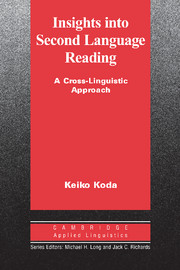Book contents
- Frontmatter
- Contents
- Tables and figures
- Series editors' preface
- Foreword
- Acknowledgments
- I THEORETICAL FOUNDATIONS
- II ESSENTIAL COMPONENTS
- 3 Word recognition
- 4 Vocabulary knowledge
- 5 Intraword awareness and word-knowledge development
- 6 Information integration in sentence processing
- 7 Discourse processing
- 8 Text structure and comprehension
- III LOOKING AT THE WHOLE
- IV THEORY INTO PRACTICE
- References
7 - Discourse processing
Published online by Cambridge University Press: 05 October 2012
- Frontmatter
- Contents
- Tables and figures
- Series editors' preface
- Foreword
- Acknowledgments
- I THEORETICAL FOUNDATIONS
- II ESSENTIAL COMPONENTS
- 3 Word recognition
- 4 Vocabulary knowledge
- 5 Intraword awareness and word-knowledge development
- 6 Information integration in sentence processing
- 7 Discourse processing
- 8 Text structure and comprehension
- III LOOKING AT THE WHOLE
- IV THEORY INTO PRACTICE
- References
Summary
Text is not a sequential display of isolated words and sentences. Rather, it is visual communication transmitting the author's intended message. Text understanding, therefore, is the process of discerning the author's communicative intent. As Gray (1960) observed more than four decades ago, comprehension entails three major endeavors – reading lines, reading between lines, and reading beyond lines – going far beyond merely linking sentences. Research on discourse processing over the last 30 years has actively pursued efforts to unveil the processes through which “text” is progressively reconstructed in readers' minds based on the information retained in the “reconstructed text.” The central research issues include how text information is represented in memory, how remembered information is organized, and the specific factors that influence the “reconstruction” process.
Using this extensive research as a base, this chapter explores its implications for L2 reading studies. Because of the unique characteristics of adult L2 readers, it is assumed that L1 and L2 text comprehension – both process and product – differ fundamentally. By systematically probing such differences, the intent is to lay foundations for developing viable models of L2 text comprehension and, in so doing, clarify further issues distinguishing L2 percepts from L1 theories. Toward that end, this chapter describes ongoing conceptualizations of discourse comprehension, with particular emphasis on two critical discourse-processing operations: text-coherence building through explicit connective devices and inferences. The unique factors affecting L2 text comprehension are then considered, and a review of L2 empirical studies is provided.
- Type
- Chapter
- Information
- Insights into Second Language ReadingA Cross-Linguistic Approach, pp. 123 - 153Publisher: Cambridge University PressPrint publication year: 2005



